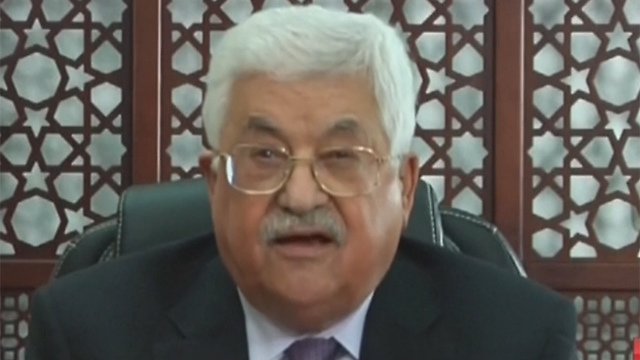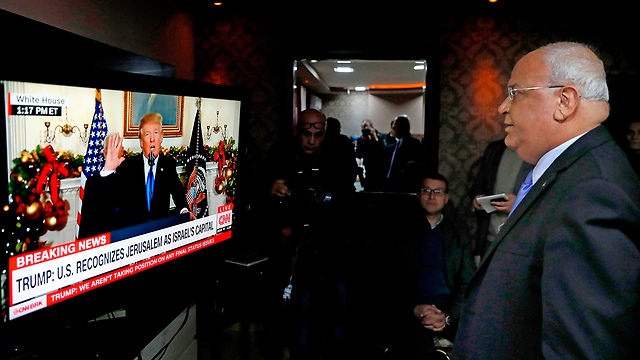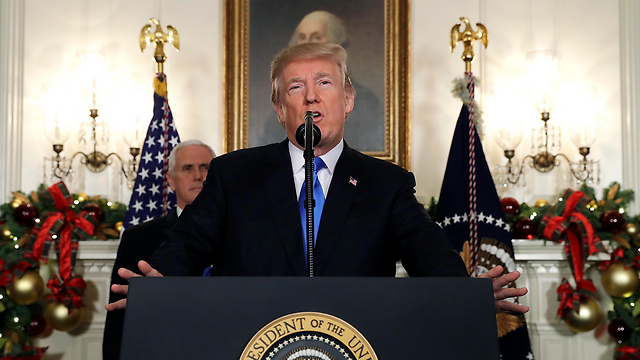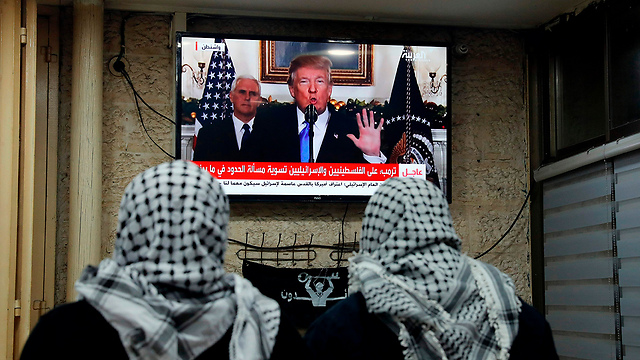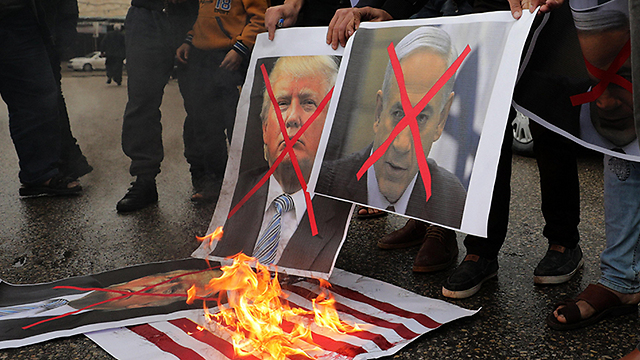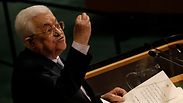

Abbas warns of 'wars without end' following US Jerusalem declaration
Palestinian president says US 'has essentially announced its withdrawal from its role as a sponsor of peace negotiations'; Hamas says Trump's announcement 'opened the gates of hell,' calls on Arabs and Muslims to 'undermine the US interests in the region' and 'shun Israel.'
Palestinian President Mahmoud Abbas warned Wednesday evening that US President Donald Trump's decision to recognize Jerusalem as Israel's capital "will lead to wars without end."
In a pre-recorded speech played on Palestine TV, Abbas said Trump has destroyed his credibility as a Mideast peace broker. "These deplorable and unacceptable measures deliberately undermine all peace efforts," he said, adding the American decision "is tantamount to the United States abdicating its role as a peace mediator."
Jerusalem, the Palestinian leader added, was the "eternal capital of the State of Palestine."
"Trump's decision will not change the reality in the city of Jerusalem. This is a Palestinian, Arab, Islamic city and it is the capital of the Arab Palestine."
"With this announcement, the American administration has chosen to violate all international and bilateral agreements and resolutions and it has chosen to violate international consensus," Abbas went on to say.
The move, he said, would serve "the extremist groups which try to turn the conflict in our region into a religious war that will drag the region... into international conflicts and endless wars."
Abbas said the Palestinian leadership will meet in the coming days and consult with Arab leaders to formulate a response.
"We've said over the past few days in talks with many countries that the Arabs will present a united front with regards to Jerusalem," he said.
Palestine Liberation Organization (PLO) Secretary-General and chief Palestinian negotiator Saeb Erekat said Trump had "destroyed" the two-state solution.
Trump also "disqualified the United States of America from any role in any peace process," he added.
"As a chief Palestinian negotiator, how can I sit with these people if they dictate on me the future of Jerusalem as Israel's capital?" he said.
"I think tonight he is strengthening the forces of extremists in this region as no one has done before," Erekat said, referring to Trump.
Palestinian officials said they switched off the lights to the giant Christmas tree in the West Bank city of Bethlehem, believed to be the city where Jesus was born, in protest.
Hamas, meanwhile, said the announcement has "opened the gates of hell on US interests in the region" and was a "flagrant aggression against the Palestinian people."
The Gaza terror group called on Arabs and Muslims to "undermine the US interests in the region" and to "shun Israel."
Senior Hamas official Izzat Rishak insisted the declaration "will not change the historical facts. The occupation will come to an end and Jerusalem will remain the capital of Palestine, the Arabs and the Muslims. There is no force on earth—not the US nor Israel—that could force reality on the ground."
Rishak promised the coming days would be "days of rage."
Hamas official Ismail Radwan called on Arab and Islamic states to "cut off economic and political ties with the US embassy and expel American ambassadors to cripple" this decision.
Islamic Jihad's second-in-command Ziad Nahala said the US decision was "a declaration of war."
"This is a day of mourning to the (Palestinian) nation, and we must act against the American arrogance. We must rely only on our unity," Nahala added.
Following the speech, Palestinians took to the streets in the Gaza Strip to protest the US declaration, with dozens of angry youths burning tires in spontaneous protests at several locations.
Jerusalem itself, however, remained calm on a cold and rainy evening after Trump's speech with no sign of protests.
More Palestinian demonstrations were set for the West Bank on Thursday, and several thousand marched in the Hamas-run Gaza Strip on Wednesday night, burning US and Israeli flags while chanting "Death to America" and "Death to Israel."
'Declaration of war'
Trump's decision jeopardizes the United States' historical role as a mediator in the Israeli-Palestinian conflict and frays relations with Arab allies that Washington relies on to help it oppose Iran and fight Sunni Islamist militants.
The leaders of Muslim nations deployed ever-harsher rhetoric to describe Trump's decision, dashing any hope of a muted response that would help avoid clashes.
Iran's Ministry of Foreign Affairs said Tehran "seriously condemns" the American decision, which violates international resolutions.
The US action will "incite Muslims and inflame a new intifada and encourage extremism and violent behavior for which the responsibility will lie with (the United States) and the Zionist regime (Israel)," the foreign ministry statement said.
The statement also called on the international community to pressure the United States not to go through with the embassy move or the recognition of Jerusalem as Israel's capital.
"The Islamic Republic of Iran has reiterated that the most important reason for the falling apart of stability and security in the Middle East is the continued occupation and the biased and unequivocal support of the American government for the Zionist regime," the statement said.
"And the deprivation of the oppressed Palestinian people from their primary rights in forming an independent Palestinian government with the noble Quds as its capital," it said, using the Arabic name for Jerusalem.
Supreme Leader Ayatollah Ali Khamenei said earlier that the United States was trying to destabilize the region and start a war to protect Israel's security.
Syrian's President Bashar Assad said the Palestinian cause will stay alive among Arabs until the establishment of a Palestinian state with Jerusalem as its capital.
"The future of Jerusalem is not determined by a state or a president but is determined by its history and by the will and determination in the Palestinian cause," Assad's office said on an official social media feed.
Jordan said the US decision was "legally null" because it consolidated Israel's occupation of the eastern sector of the contested city in the 1967 Six-Day War.
The American announcement violated past UN Security Council resolutions that "stipulated the non recognition of the Israeli occupation" of the West Bank and the eastern sector of the city, government spokesperson Mohammad al-Momani told state news agency Petra.
The kingdom also considered "all unilateral moves that sought to create new facts on the ground as null and void," the government spokesman added.
Foreign Minister Ayman Safadi said later in a tweet that the move "frustrated" peace efforts, adding that the status of Jerusalem must be "determined in direct negotiations" between the Palestinians and Israelis.
"Jordan rejects the decision and all its implications and will continue to work for an independent Palestinian state with East Jerusalem as its capital," Safadi added.
Jordan and the Palestinians also called for an emergency meeting of the Arab League. A government source said Palestinian President Abbas was due to hold talks with King Abdullah II on Thursday in a stepped-up diplomatic offensive to counter Trump's plan.
Protests broke out in parts of Jordan's capital Amman inhabited by Palestinian refugees, with youths chanting anti-American slogans. In the Baqaa refugee camp on Amman's outskirts, hundreds roamed the streets denouncing Trump and urging Jordan to scrap its 1994 peace treaty with Israel. "Down with America...America is the mother of terror," they chanted.
Jordanian deputies in a special parliamentary session on Wednesday condemned the move and urged the government to expel the US ambassador and boycott US goods. A dozen activists staged a sit-in near the gates of the US embassy.
Jordan's powerful mainstream Islamist movement, the country's largest political party and opposition group, said it would stage several major rallies across the country in the next few days and after Friday prayers.
Lebanon's President Michel Aoun said Trump's decision was dangerous and threatened the credibility of the United States as a broker of the peace process in the region.
He said the decision had put back the peace process by decades, and had threatened regional stability and perhaps global stability.
Lebanon's Prime Minister Saad Hariri said on Twitter that Lebanon rejected the decision and had the utmost solidarity with the Palestinian people and their right to establish an independent state with Jerusalem as its capital.
The Egyptian Foreign Ministry issued a statement saying Trump's decision is a violation of international resolutions on the city's status, adding Cairo is worried about the impact of the US move on the stability of the region and about its "extremely negative" impact on the Israeli-Palestinian peace process.
Egypt's President Abdel Fattah al-Sisi spoke to Palestinian President Abbas shortly after the declaration was made, expressing Cairo's rejection of the move and of "any implications resulting from it."
A statement from the Saudi Royal Court said the Saudi government had expressed "condemnation and deep regret" about the move, branding it "unjustified and irresponsible," and said it goes against the "historical and permanent rights of the Palestinian people."
Saudi Arabia's King Salman discussed the "most prominent developments" in the region in a telephone call with Turkish President Recep Tayyip Erdoğan.
Turkey's Foreign Ministry condemned the decision as "irresponsible" and called on Washington to reconsider the move.
"We condemn the irresponsible statement of the US administration... declaring that it recognizes Jerusalem as the capital of Israel and it will be moving the US Embassy in Israel to Jerusalem," the Turkish Foreign Ministry said in a statement.
"We call upon the US Administration to reconsider this faulty decision which may result in highly negative outcomes and to avoid uncalculated steps that will harm the multicultural identity and historical status of Jerusalem," it said.
Several hundred protesters gathered outside the US consulate in Istanbul, a Reuters cameraman at the scene said. The protest was largely peaceful, although some of the demonstrators threw coins and other objects at the consulate.
Ahead of the declaration, Erdogan called for a summit of the Organization of Islamic Cooperation (OIC), the main pan-Islamic body, in Istanbul next week to display joint action over Jerusalem.
Qatar's foreign minister, Sheikh Mohammed bin Abdulrahman al-Thani, said Trump's undertaking was a "death sentence for all who seek peace" and called it "a dangerous escalation."
Tunisia's powerful labor union UGTT said Trump's declaration was a declaration of war, calling for mass protests.
Tunisia's foreign ministry said in a separate statement Trump's move "seriously threatens to undermine the foundations of the (Israeli-Palestinian) peace process."
Morocco summoned the US charge d'affaires to express its deep concern over the Trump's declaration. Morocco's foreign minister "reiterated the constant support and full solidarity of the Kingdom of Morocco towards the Palestinian people so that they can recover their legitimate rights."
Indonesian President Joko Widodo, leader of the world's largest Muslim-majority nation, condemned the US declaration on Thursday morning.
"Indonesia strongly condemns the United States' unilateral recognition of Jerusalem as the capital of Israel and asks the US to reconsider the decision," Widodo told a news conference.
"This can rock global security and stability," he said.
Malaysian Prime Minister Najib Razak called on Muslims everywhere to strongly oppose any recognition of Jerusalem as Israel's capital.
"I call on all Muslims across the world to let your voices be heard, make it clear that we strongly oppose any recognition of Jerusalem as Israel's capital for all time," Najib said in his speech at an annual gathering of the ruling party in Kuala Lumpur.
Liad Osmo, Roi Kais. Reuters, the Associated Press and AFP contributed to this report.














